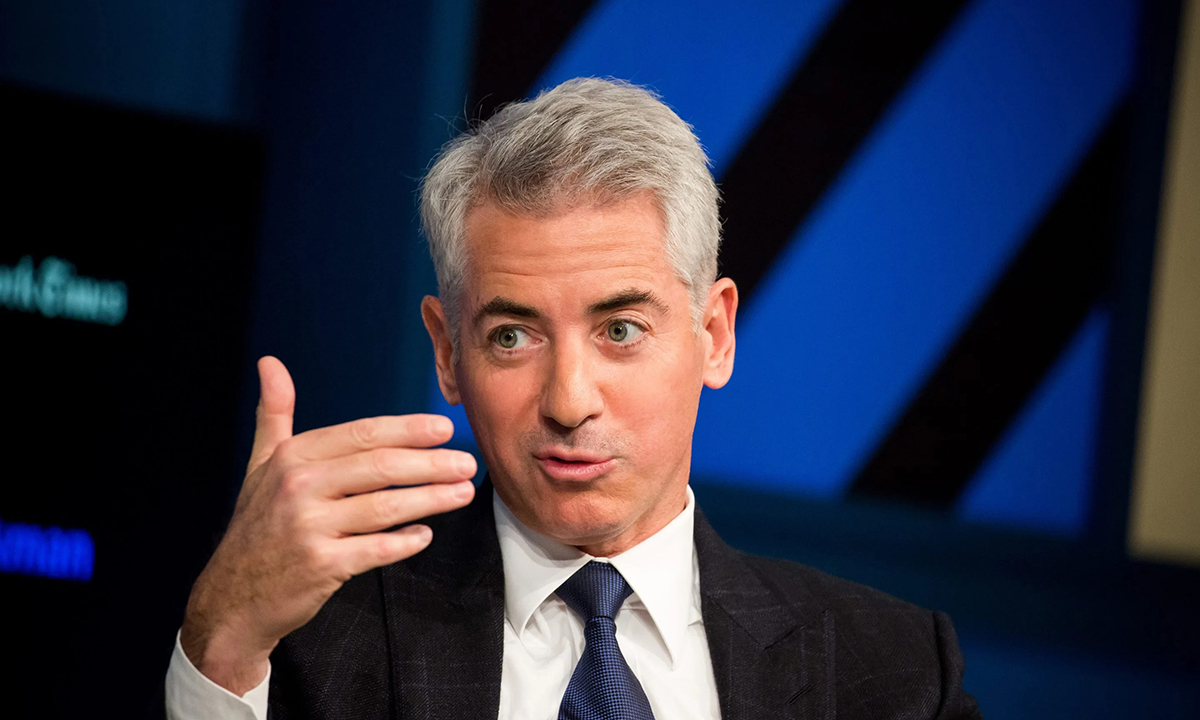
在《财富》美国500强公司的董事会会议室、时髦的华尔街酒吧、美国各地商学院的大厅里,所有人都在谈论明年美国的通货膨胀“将走向何方”。
最近几个月,越来越多的经济学家和商业领袖认为,美国即将结束消费物价高企的折磨。但也有一批同样资深的经济学家们认为,历史表明通货膨胀并不容易被“驯服”。
沃顿商学院(Wharton School)的教授杰里米·西格尔和对冲基金经理、亿万富翁比尔·阿克曼上周的说法,代表了这两种截然不同的观点。
西格尔在11月21日表示,他认为美联储(Federal Reserve)今年的六次加息已经控制住了通货膨胀,只是数据还没有显示出来实际效果。
西格尔对美国消费者新闻与商业频道(CNBC)表示:“我认为基本上90%的通货膨胀将会消失。”他提到了增速放缓的房地产市场作为证据。
但潘兴广场资本管理公司(Pershing Square Capital Management LP)的创始人及首席执行官比尔·阿克曼在上周表示,他认为通货膨胀远没有得到控制。
比尔·阿克曼在11月17日召开的投资者营收电话会议上说:“我们认为,与历史相比,通胀率未来会继续结构性上升。”他指出,去全球化和清洁能源转型等趋势会导致成本持续上涨。
在这场事关重大的关于通货膨胀的辩论中,阿克曼和西格尔是两个阵营的重要角色,谁的预测准确,将影响你的401(k)账户的价值,甚至抵押贷款的月供。让我们分析一下他们的主张。
阿克曼的结构性通胀和股票风险观点
按照消费物价指数(CPI)测量,今年10月美国的通货膨胀较一年前上升了7.7%。虽然这远低于6月的最高点9.1%,但距离美联储2%的目标仍然相去甚远。
许多鹰派经济学家和商业领袖认为,即使今年已经激进加息,美联储要想真正控制通胀,仍然有很多工作要做。比尔·阿克曼称,通胀率或许根本不可能回落到2%。
他在上周告诉投资者:“我们不认为美联储有能力使通货膨胀回落到2%左右的水平。”
这位对冲基金老板解释称,全球经济出现了一些长期结构性变化,例如加息、清洁能源转型和去全球化等,这些变化将增加企业的成本,导致未来几年通胀居高不下。
阿克曼尤其认为,将原先位于海外的业务重新搬回美国的在岸生产趋势,可能会提高美国企业的劳动力和原材料成本,加剧通胀。
他说:“我们最终不得不接受去全球化导致的更高通胀水平。我们坚信一种观点,那就是更多的企业搬到靠近国内的地方,会推高在美国国内的经营成本。”
由于这些长期结构性变化将加剧通胀,阿克曼认为,美联储只能继续加息。但他解释道,加息只能推高债券的长期利率,而这意味着“股市面临风险”。
西格尔的住房通货紧缩与股市暴涨观点
西格尔和其他鸽派经济学家认为,通胀最严重的时期已经结束。
他们指出,房价约占CPI的三分之一,而CPI是最常用的通货膨胀指标,而且房地产市场的增长速度已经在放缓。
目前在28个曾经异常火爆的房地产市场中,房价较一年前下跌了5%甚至更高,抵押贷款购房申请同期减少了41%。
西格尔表示,美联储忽视了处境不佳的房地产市场,因为他们关注的是过时的CPI数据,对房价变化的统计存在滞后。
他解释说:“我一直认为房价正在下跌,但政府计算房价的方式过于滞后,因此显示房价仍然在上涨。”
沃顿商学院的教授西格尔认为,未来几个月的新数据,包括凯斯-席勒房价指数(Case-Shiller Home Price Index),将开始证明房地产市场正在经历通货紧缩,并促使美联储暂停加息。
他说:“美联储花费了太长时间才明白。他们并不知道通胀已经基本上结束,但未来他们会明白。而且我认为他们可能在今年晚些时候或者明年早些时候认识到这一点。我认为,到时候股价就会大幅上涨。”
西格尔称,当美联储意识到通胀正在回落,并决定暂停加息甚至降息时,标准普尔500指数(S&P 500)将上涨15%至20%。(财富中文网)
翻译:刘进龙
审校:汪皓
在《财富》美国500强公司的董事会会议室、时髦的华尔街酒吧、美国各地商学院的大厅里,所有人都在谈论明年美国的通货膨胀“将走向何方”。
最近几个月,越来越多的经济学家和商业领袖认为,美国即将结束消费物价高企的折磨。但也有一批同样资深的经济学家们认为,历史表明通货膨胀并不容易被“驯服”。
沃顿商学院(Wharton School)的教授杰里米·西格尔和对冲基金经理、亿万富翁比尔·阿克曼上周的说法,代表了这两种截然不同的观点。
西格尔在11月21日表示,他认为美联储(Federal Reserve)今年的六次加息已经控制住了通货膨胀,只是数据还没有显示出来实际效果。
西格尔对美国消费者新闻与商业频道(CNBC)表示:“我认为基本上90%的通货膨胀将会消失。”他提到了增速放缓的房地产市场作为证据。
但潘兴广场资本管理公司(Pershing Square Capital Management LP)的创始人及首席执行官比尔·阿克曼在上周表示,他认为通货膨胀远没有得到控制。
比尔·阿克曼在11月17日召开的投资者营收电话会议上说:“我们认为,与历史相比,通胀率未来会继续结构性上升。”他指出,去全球化和清洁能源转型等趋势会导致成本持续上涨。
在这场事关重大的关于通货膨胀的辩论中,阿克曼和西格尔是两个阵营的重要角色,谁的预测准确,将影响你的401(k)账户的价值,甚至抵押贷款的月供。让我们分析一下他们的主张。
阿克曼的结构性通胀和股票风险观点
按照消费物价指数(CPI)测量,今年10月美国的通货膨胀较一年前上升了7.7%。虽然这远低于6月的最高点9.1%,但距离美联储2%的目标仍然相去甚远。
许多鹰派经济学家和商业领袖认为,即使今年已经激进加息,美联储要想真正控制通胀,仍然有很多工作要做。比尔·阿克曼称,通胀率或许根本不可能回落到2%。
他在上周告诉投资者:“我们不认为美联储有能力使通货膨胀回落到2%左右的水平。”
这位对冲基金老板解释称,全球经济出现了一些长期结构性变化,例如加息、清洁能源转型和去全球化等,这些变化将增加企业的成本,导致未来几年通胀居高不下。
阿克曼尤其认为,将原先位于海外的业务重新搬回美国的在岸生产趋势,可能会提高美国企业的劳动力和原材料成本,加剧通胀。
他说:“我们最终不得不接受去全球化导致的更高通胀水平。我们坚信一种观点,那就是更多的企业搬到靠近国内的地方,会推高在美国国内的经营成本。”
由于这些长期结构性变化将加剧通胀,阿克曼认为,美联储只能继续加息。但他解释道,加息只能推高债券的长期利率,而这意味着“股市面临风险”。
西格尔的住房通货紧缩与股市暴涨观点
西格尔和其他鸽派经济学家认为,通胀最严重的时期已经结束。
他们指出,房价约占CPI的三分之一,而CPI是最常用的通货膨胀指标,而且房地产市场的增长速度已经在放缓。
目前在28个曾经异常火爆的房地产市场中,房价较一年前下跌了5%甚至更高,抵押贷款购房申请同期减少了41%。
西格尔表示,美联储忽视了处境不佳的房地产市场,因为他们关注的是过时的CPI数据,对房价变化的统计存在滞后。
他解释说:“我一直认为房价正在下跌,但政府计算房价的方式过于滞后,因此显示房价仍然在上涨。”
沃顿商学院的教授西格尔认为,未来几个月的新数据,包括凯斯-席勒房价指数(Case-Shiller Home Price Index),将开始证明房地产市场正在经历通货紧缩,并促使美联储暂停加息。
他说:“美联储花费了太长时间才明白。他们并不知道通胀已经基本上结束,但未来他们会明白。而且我认为他们可能在今年晚些时候或者明年早些时候认识到这一点。我认为,到时候股价就会大幅上涨。”
西格尔称,当美联储意识到通胀正在回落,并决定暂停加息甚至降息时,标准普尔500指数(S&P 500)将上涨15%至20%。(财富中文网)
翻译:刘进龙
审校:汪皓
In boardrooms at Fortune 500 companies, at swanky Wall Street bars, and in the halls of business schools across the country, there’s been a consistent debate over “what’s next?” for U.S. inflation over the past year.
In recent months, a growing chorus of economists and business leaders have made the case that the scourge of sky-high consumer prices is coming to an end. But a separate group of similarly seasoned economic minds believes that history shows inflation won’t be so easily tamed.
Arguments made by Wharton Professor Jeremy Siegel and the billionaire hedge fund manager Bill Ackman over the past week exemplify these opposing ideas.
Siegel said on November 21 that he believes the Fed’s six interest rate hikes this year have already slayed inflation, and the data just doesn’t show it yet.
“I think basically 90% of our inflation is gone,” he told CNBC, pointing to the slowing housing market as evidence.
But Bill Ackman, the founder and CEO of Pershing Square Capital, said just last week that he believes inflation is far from under control.
“We think inflation is going to be structurally higher going forward than it has been historically,” he said on a Nov. 17 earnings call with investors, arguing that trends like deglobalization and the clean energy transition will lead to sustained cost increases.
Ackman and Siegel are two heavyweights in the high-stakes inflation debate, and who turns out to be right could determine everything from the value of your 401(k) to how much you pay for your mortgage. Here’s a look into their arguments.
Ackman’s structural inflation and equity risk
Inflation, as measured by the consumer price index (CPI), rose 7.7% from a year ago in October. While that’s well below the 9.1% peak seen in June, it’s a far cry from the Fed’s 2% target rate.
Many hawkish economists and business leaders argue that even after aggressively raising interest rates this year, the Fed has a lot of work to do to get inflation truly under control. And Bill Ackman believes they might not be able to reach 2% at all.
“We do not believe that it’s likely the Federal Reserve is going to be able to get inflation back to a kind of consistent 2% level,” he told investors last week.
The hedge funder went on to explain that there are long-term structural changes to the global economy like rising wages, the clean energy transition, and deglobalization that will increase companies’ costs and keep inflation elevated in coming years.
In particular, Ackman argued that on-shoring—the relocation of previously foreign business operations back to the U.S.—could raise labor and material costs for U.S. companies and increase inflation.
“We will have to ultimately accept a higher level of inflation that has to do with deglobalization,” he said. “We are a big believer in the thesis that a lot more business is going to come closer to home and it is more expensive to do business here.”
Because of these long-term structural changes that will exacerbate inflation, Ackman believes that the Fed will have to stick to its guns with interest rate hikes. But he explained that these rising rates will only serve to push long-term interest rates on bonds higher, which is “a risk for equities.”
Siegel’s shelter deflation and soaring stocks
Siegel and more dovish economists like him argue that the worst of inflation is already over.
They point to the fact that shelter prices make up roughly a third of CPI, one of the most common measures of inflation, and note that the housing market is already slowing.
There are now 28 once-red-hot housing markets where home prices have dropped 5% or more from a year ago and mortgage purchase applications are down 41% over the same period.
Siegel says that the Fed has ignored the ailing housing market because they are looking at stale CPI data, which measures changes in shelter prices with a lag.
“My point has been housing has declined but the way the government computes it is so lagged that it will continue to show increases,” he explained.
The Wharton professor argues that new data over the coming months, including the Case-Shiller Home Price Index, will begin to properly illustrate the deflation coming from the housing market, leading the Fed to pause their rate hikes.
“It’s taken way too long for the Fed to get it and they haven’t gotten it yet that inflation is basically over, but they will, and I think they’re going to get it maybe very late this year or early next year,” he said. “And I think as soon as they get it you’re going to see a big increase in equity prices.”
Siegel believes that when the Fed recognizes that inflation is fading and decides to pause rate hikes or even cut rates, it will spark a 15% to 20% rally in the S&P 500.






